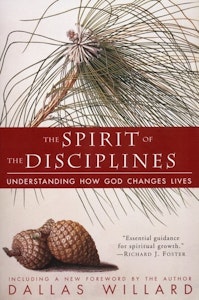 Excerpt from The Spirit of the Disciplines
Excerpt from The Spirit of the Disciplines
Here is one of the most important disciplines of engagement, yet most overlooked and misunderstood. It is the completion of worship, for it dwells on the greatness of God as shown in his goodness to us. We engage in celebration when we enjoy ourselves, our life, our world, in conjunction with our faith and confidence in God’s greatness, beauty, and goodness. We concentrate on our life and world as God’s work and as God’s gift to us.
Typically this means that we come together with others who know God to eat and drink, to sing and dance, and to relate stories of God’s action for our lives and our people. Miriam (Exodus 15:20), Deborah (Judges 5), and David (2 Samuel 6:12 — 16) provide us with vivid biblical examples of celebration, as does Jesus’ first public miracle at the wedding in Cana (John 2), or the appointed feasting periods of the nation of Israel. Celebration was also maintained by the church in its established feast days up to the Protestant era and is continued to today by the Roman Catholic and the Orthodox communions.
Holy delight and joy is the great antidote to despair and is a wellspring of genuine gratitude — the kind that starts at our toes and blasts off from our loins and diaphragm through the top of our head, flinging our arms and our eyes and our voice upward toward our good God. The unabashedly sensual and earthy character of celebration or jubilee is nowhere more clearly portrayed than in the instructions contained in Deuteronomy 14. Here a tithe of goods produced was to be used in a feast before the Lord on a vacation trip to the big city of Jerusalem. If the city was too far for individuals to carry their own produce as provision, the tithe was to be sold “for money,” and the money taken to Jerusalem where — are you ready for this? — “Thou shalt bestow that money for whatsoever thy soul lusteth after, for oxen, or for sheep, or for wine, or for strong drink, or whatsoever thy soul desireth: and thou shalt eat there before the Lord thy God, and thou shalt rejoice, thou, and thine household, and the Levite that is within thy gates” (14:26 – 27).
The “strong drink” mentioned here was, shall we say, not exactly sassafras tea! But the point of this exercise, nonetheless, was precisely “that thou mayest learn to fear the Lord thy God always” (14:23). The book of Ecclesiastes contains similar admonitions. For example: “Then I realized that it is good and proper for a man to eat and drink, and to find satisfaction in his toilsome labor under the sun during the few days of life God has given him — for this is his lot. Moreover, when God gives any man wealth and possessions, and enables him to enjoy them, to accept his lot and be happy in his work — this is a gift of God. He seldom reflects on the days of his life, because God keeps him occupied with gladness of heart” (5:18 – 20, NIV; see also 2:24 and 3:12 – 23).
Be assured that I’m not in favor of drunkenness as a spiritual discipline, or even so much as a good thing. Abuse of alcohol is currently a curse upon the earth. Celebration is not the whole life or discipline of the faithful, and it requires supplementation and correction by the rest of a balanced practice. But this world is radically unsuited to the heart of the human person, and the suffering and terror of life will not be removed no matter how “spiritual” we become. It is because of this that a healthy faith before God cannot be built and maintained, without heartfelt celebration of his greatness and goodness to us in the midst of our suffering and terror. “There is a time to weep, and a time to laugh; a time to mourn, and a time to dance” (Eccles. 3:4) It is the act and discipline of faith to seize the season and embrace it for what it is, including the season of enjoyment.
Certainly this will seem far too hedonistic to many of us. But we dishonor God as much by fearing and avoiding pleasure as we do by dependence upon it or living for it. Listen once more to Uncle Screwtape. He is chiding his demon protege, Wormwood, for allowing his ”patient” to read a book he really enjoyed and take a walk in the country that filled him with joy.
“In other words,” says Screwtape, “you allowed him two real positive pleasures. Were you so ignorant as not to see the danger of this?” Then he elaborates:
The man who truly and disinterestedly enjoys any one thing in the world, for its own sake, and without caring twopence what other people say about it, is by that very fact forearmed against some of our subtlest modes of attack. You should always try to make the patient abandon the people or food or books he really likes in favor of the “best” people, the “right” food, the “important” books. I have known a human defended from strong temptations to social ambition by a still stronger taste for tripe and onions.1
Elsewhere Screwtape remarks that when demons are dealing with any pleasure in its healthy and normal and satisfying form, they are on the enemy’s ground. We’ve won many a soul through pleasure, he says, “All the same, it is His invention, not ours. He made the pleasures: all our research so far has not enabled us to produce one.”
Faith in its celebration sometimes becomes a delirious joy coursing through our bodily being, when we really begin to see how great and lovely God is and how good he has been to us. Even those commonly thought to be ruined (Luke 6:20 – 23; Matthew 5:3 – 12) — the poor, the depressed, the persecuted — have a godlike well-being in his company and Kingdom. Feasting, dancing, singing, oration become insuppressible. “For by thee,” we shout, “I have run through a troop: and by my God I have leaped over a wall” (Psalm 18:29). “Thou hast turned for me my mourning into dancing: thou hast put off my sackcloth, and girded me with gladness; to the end that my glory may sing praise to thee, and not be silent. O Lord my God, I will give thanks unto thee forever!” (Psalm 30:11 – 12). But that is not yet enough. The hills must sing and the trees break out in applause for God (Isaiah 55:12). Every created thing must praise the Lord (Psalm 148- 150).
Celebration heartily done makes our deprivations and sorrows seem small, and we find in it great strength to do the will of our God because his goodness becomes so real to us.
Excerpted from Dallas Willard’s The Spirit of the Disciplines. Courtesy of HarperOne (New York, 1998).
[1] C.S. Lewis. The Screwtape Letters. Geoffrey Bles, 1942.
Photo by Joel Durkee on Unsplash
Text First Published December 1987 · Last Featured on Renovare.org October 2021


